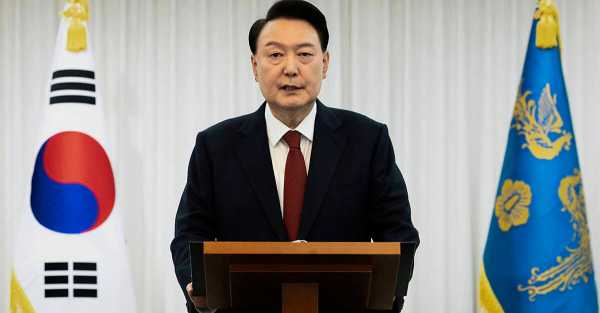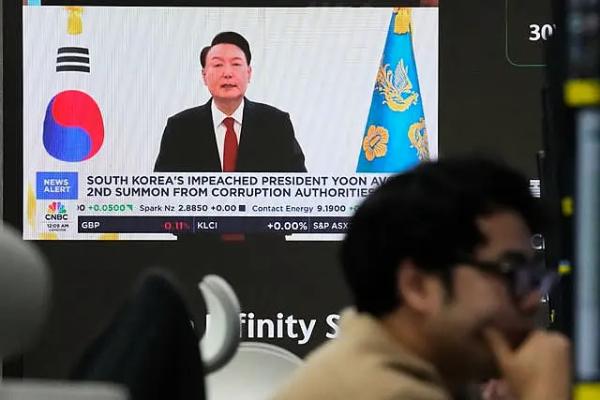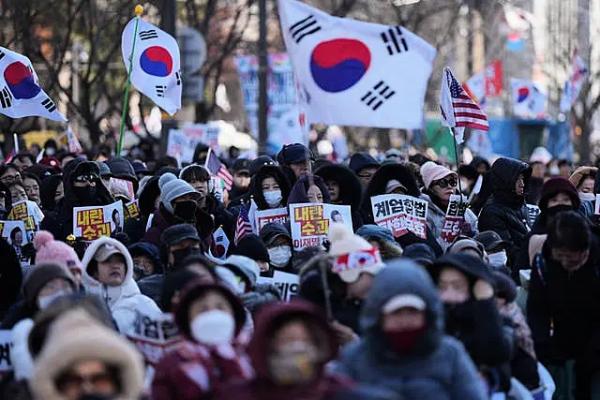
South Korean law enforcement officials have requested a court warrant to detain impeached President Yoon Suk Yeol.
They are investigating whether his short-lived martial law decree earlier this month amounted to rebellion.
The Corruption Investigation Office for High-Ranking Officials, which is leading a joint investigation with police and military authorities into the power grab that lasted only a few hours, confirmed it requested the warrant from the Seoul Western District Court on Monday.
Investigators plan to question Mr Yoon on charges of abuse of authority and orchestrating a rebellion.
Yoon Kap-keun, the president’s lawyer, denounced the detention attempt and filed a challenge with the same court, arguing that the warrant request was invalid.

He also claimed the anti-corruption agency lacked the legal authority to investigate rebellion charges.
Still, he did not answer how the legal team would respond if the court approved the warrant for the president’s detainment.
“An incumbent president cannot be prosecuted for abuse of power,” the lawyer said.
“Of course, there are differing academic opinions on whether a president can be investigated for abuse of power and some assert that investigations are possible. But even when investigations are allowed, the prevailing opinion is that they should be exercised with the utmost restraint.”
Han Min-soo, spokesperson for the liberal opposition Democratic Party, called for the court to issue the warrant, saying Mr Yoon’s detainment would be the first step towards “ending the rebellion and restoring normality”.
The warrant request came after Mr Yoon dodged several requests by the joint investigation team and public prosecutors to appear for questioning and also blocked searches of his offices.
While Mr Yoon has the presidential privilege of immunity from criminal prosecution, such protections do not extend to allegations of rebellion or treason.
It is not clear whether the court will grant the warrant or whether Mr Yoon can be compelled to appear for questioning.

Under the country’s laws, locations potentially linked to military secrets cannot be seized or searched without the consent of the person in charge and it is unlikely Mr Yoon will voluntarily leave his residence if he faces detainment.
There are also concerns about possible clashes with Mr Yoon’s presidential security service if authorities attempt to forcibly detain him.
Mr Yoon’s presidential powers were suspended after the National Assembly voted to impeach him on December 14 over his imposition of martial law that lasted only hours but has triggered weeks of political turmoil, halted high-level diplomacy and rattled financial markets.
His fate lies with the Constitutional Court, which has begun deliberations on whether to uphold the impeachment and formally remove Mr Yoon from office or reinstate him.
Mr Yoon has defended the martial law decree as a necessary act of governance, describing it as a warning against the liberal opposition Democratic Party, which has been bogging down his agenda with its majority in the parliament.
Parliament voted last week to also impeach Prime Minister Han Duck-soo, who had assumed the role of acting president after Mr Yoon’s powers were suspended, over his reluctance to fill three Constitutional Court vacancies ahead of the court’s review of Mr Yoon’s case.
The country’s new interim leader is Deputy Prime Minister Choi Sang-mok, who is also finance minister.
Sourse: breakingnews.ie